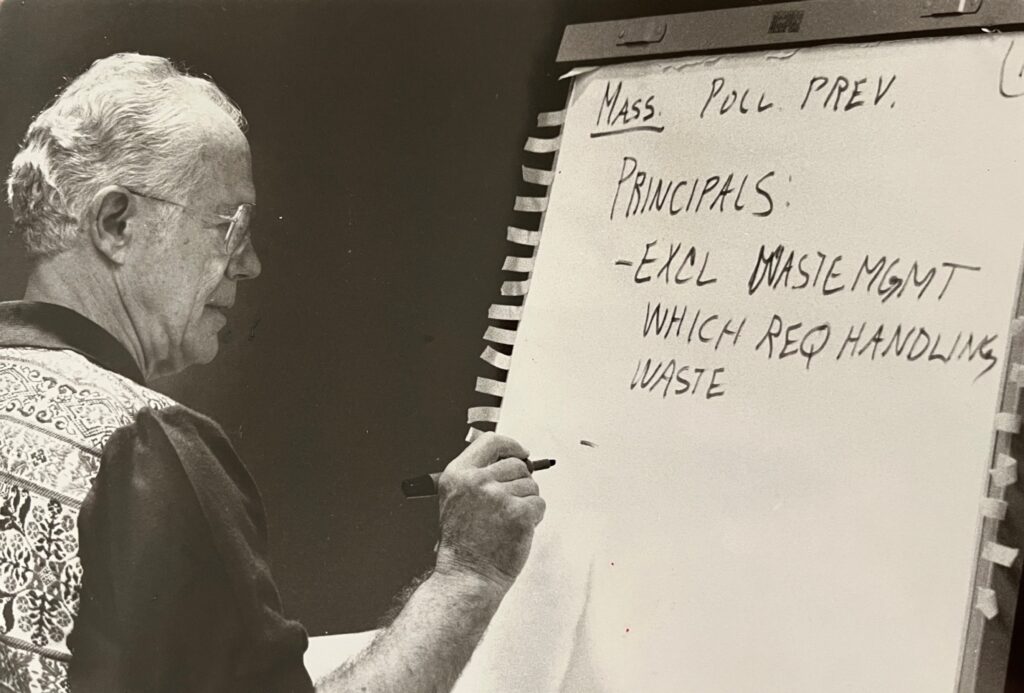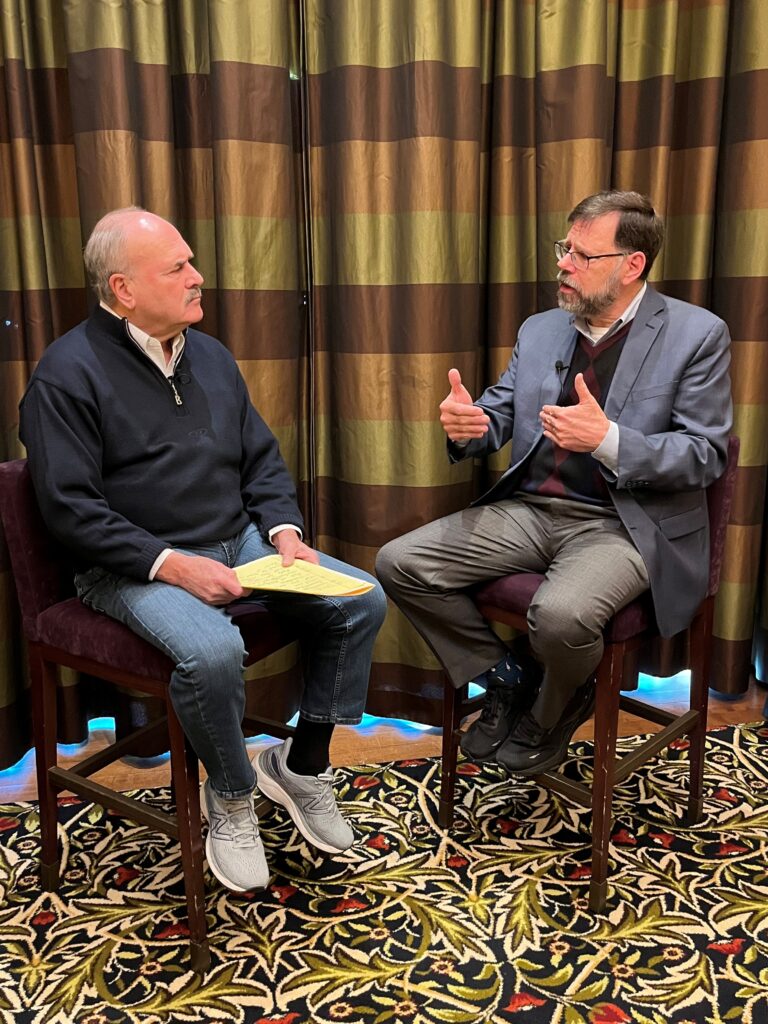For 50 years, Keystone Policy Center has played a pivotal role in shaping the energy sector through its collaborative approach to problem-solving. From nuclear waste management to tribal energy sovereignty, the Keystone Energy Board, and climate change policy, Keystone has facilitated groundbreaking dialogues that have shaped energy policy and governance. As part of our 50th-anniversary celebration, we are highlighting Keystone’s historical impact on energy issues—work that has helped bridge divides, inform policy, and drive lasting change in one of the world’s most complex industries.
The Early Years: Addressing Nuclear Waste and Tribal Energy Development

In the 1970s and 1980s, one of the most pressing and contentious energy issues in the U.S. was nuclear waste management. As nuclear power expanded, so did the challenge of safely disposing of radioactive waste. The environmental risks, combined with public opposition and regulatory uncertainty, made it a politically volatile issue. Energy industry leaders, government agencies, and environmental organizations struggled to find common ground, often clashing over proposed waste storage sites and long-term disposal strategies.
Although the nuclear waste issue remains unresolved at a national level, Keystone’s early efforts demonstrated the power of inclusive dialogue in tackling highly contentious energy challenges. The lessons learned in these discussions helped shape future Keystone initiatives, from regulatory policy to climate change.
Keystone also recognized the need to support Native American tribes in asserting greater control over their energy resources. Historically, energy development on tribal lands was brokered by external entities, often leaving tribal leaders with little influence over decisions affecting their communities. To address this, Keystone facilitated discussions that led to the creation of the Indian Business Roundtable, a pioneering forum where tribal leaders and energy industry executives could engage as equal partners.
“The energy companies didn’t understand tribal politics; they were just used to dealing with the Bureau of Indian Affairs. But all of a sudden, they had to deal with the tribes directly. We put together the Indian Business Roundtable, sponsored by Keystone, bringing tribal leaders and business leaders together. These meetings were incredibly productive and really helped both sides understand how to work together on energy deals,” recalled John Echohawk, founder of the Native American Rights Fund.
This work led to more equitable energy agreements and strengthened tribal sovereignty, setting a precedent for future Keystone initiatives in environmental justice and resource management.
The Keystone Energy Board: A Model for Constructive Dialogue
One of Keystone’s most significant contributions to the energy sector has been the establishment of the Keystone Energy Board. This forum brought together an unprecedented mix of stakeholders—including utilities, policymakers, environmental groups, and industry leaders—to tackle critical energy issues collaboratively.
“At first, I was a little bit protective—this was all new to me, sitting around and sharing my strategic thoughts with others. But over time, we built a level of trust. Once that happened, we began to be much more open, collaborative, and sensitive to different viewpoints. Keystone started all of that,” said David Owens, a longtime energy executive and early member of the Energy Board.
The board played a key role in shaping major policy decisions, particularly in areas like grid resilience, transmission policy, and regulatory frameworks. Clinton Vince, an energy policy expert, recalled how Keystone’s facilitation helped resolve a particularly tense debate:
“We were dealing with transmission issues, and one CEO was getting pretty wound up in his righteousness. Bob Craig, in his gravelly voice, said, ‘We need to lighten up.’ There was a moment of silence, and then, for the rest of the dialogue, a spirit of cooperation that had been absent emerged. That meeting ended up shaping transmission policy that was later passed into legislation.”
Keystone’s Leadership on Climate and Decarbonization
As climate change became an increasingly urgent issue in the late 20th century, Keystone stepped into a leadership role, helping to move energy policy toward sustainability. In 1989, as public concern about climate change grew, Keystone convened a steering committee to evaluate the need for a national dialogue. This led to an 18-month initiative that brought together representatives from government, industry, environmental groups, and research institutions to explore the implications of a changing climate and the role of national energy policy in reducing greenhouse gas emissions.
By the early 2000s, Keystone facilitated additional climate-focused dialogues, convening leaders from across sectors to discuss the need for emissions reductions and policy approaches such as carbon pricing. The results of these discussions helped guide industry and government decision-making, encouraging early investments in emissions reductions—investments that are now beginning to pay off.
“I was truly disturbed by the reputation of the electric utility industry as one of the biggest polluters. And then, along came climate change—an issue my board wasn’t eager to discuss. But participating in Keystone dialogues changed that,” said Tom Kuhn, former president of the Edison Electric Institute. “They brought together environmental leaders, policymakers, and industry executives in a way that encouraged real solutions. Because of those conversations, we made major reductions in pollutants and got serious about climate legislation.”
Keystone’s leadership in climate action has had a ripple effect across the energy industry. Its consensus-driven model has helped shift regulatory approaches, encouraged businesses to take proactive steps toward sustainability, and demonstrated that climate action and economic growth are not mutually exclusive. As new challenges emerge—such as grid modernization, clean energy transitions, and climate resilience—Keystone remains at the forefront, ensuring that diverse voices are heard in shaping solutions.

Looking Ahead: Keystone’s Enduring Impact on Energy Policy
Keystone’s collaborative model remains as relevant as ever in today’s rapidly evolving energy landscape. Emerging challenges—such as the transition to renewable energy, grid modernization, and the electrification of transportation—require the kind of inclusive and trust-based dialogue that Keystone has facilitated for decades.
“Stepping into an Energy Board session gives you the input from sectors outside your own, which is essential,” said Jane Lewis Raymond, a longtime Energy Board member and founder of Hilltop Strategies. “Keystone levels the playing field with fact-based, science-based discussions, ensuring everyone has a common language before tackling solutions. That’s what makes it unique.”
The legacy of Keystone’s work in energy is not just about the policies it has helped shape—it’s about the culture of collaboration it has fostered. As new energy challenges emerge, Keystone will continue to play a critical role in ensuring that diverse voices are at the table, working together to develop solutions that benefit us all.
To hear more about Keystone’s impact in energy over the past 50 years, listen to our three-part podcast series embedded below.


 Effective March 1, 2025, Thomas J. Vilsack, former United States Secretary of Agriculture and Governor of Iowa, became the first Chief Executive Officer for the World Food Prize Foundation. In this new role, Governor Vilsack is focusing on expanding the Foundation’s global network, and will further position the Foundation as a leader in addressing global food and nutrition insecurity, continuing his lifetime of public service.
Effective March 1, 2025, Thomas J. Vilsack, former United States Secretary of Agriculture and Governor of Iowa, became the first Chief Executive Officer for the World Food Prize Foundation. In this new role, Governor Vilsack is focusing on expanding the Foundation’s global network, and will further position the Foundation as a leader in addressing global food and nutrition insecurity, continuing his lifetime of public service. Shelby Coffey III is a distinguished journalist, media executive, and thought leader whose career has helped shape the landscape of American news and public discourse. Over several decades, Coffey has held some of the most influential roles in journalism, including serving as editor of the Los Angeles Times, executive vice president of ABC News, and deputy managing editor of The Washington Post. His editorial leadership extended to key roles as president of CNN Financial News, editor of the Dallas Times Herald, and U.S. News & World Report.
Shelby Coffey III is a distinguished journalist, media executive, and thought leader whose career has helped shape the landscape of American news and public discourse. Over several decades, Coffey has held some of the most influential roles in journalism, including serving as editor of the Los Angeles Times, executive vice president of ABC News, and deputy managing editor of The Washington Post. His editorial leadership extended to key roles as president of CNN Financial News, editor of the Dallas Times Herald, and U.S. News & World Report. Jerry Steiner has spent 40 years involved in agriculture following growing up on a Wisconsin dairy farm. He began his career with Monsanto, in multiple business leadership roles. From 2003-2013 he served as a member of the Executive team, as the company’s Executive Vice President of Sustainability and Corporate Affairs. He led the company’s global Government, Public and Industry Affairs teams across the 70 countries where Monsanto conducts business. This experience got Jerry connected to the Keystones centers work in agriculture. Key among his responsibilities were shaping the company’s public policy and building partnerships aimed at helping farmers around the world produce more food, while conserving valuable resources like water and energy. Two unique partnership that developed under his leadership were drought tolerant corn with 5 African countries, CIMMYT and the Gates foundation, and a building a sustainable business model in Brazil with the value chain leading to significant multi-company investment and soybean varieties that can protected themselves.
Jerry Steiner has spent 40 years involved in agriculture following growing up on a Wisconsin dairy farm. He began his career with Monsanto, in multiple business leadership roles. From 2003-2013 he served as a member of the Executive team, as the company’s Executive Vice President of Sustainability and Corporate Affairs. He led the company’s global Government, Public and Industry Affairs teams across the 70 countries where Monsanto conducts business. This experience got Jerry connected to the Keystones centers work in agriculture. Key among his responsibilities were shaping the company’s public policy and building partnerships aimed at helping farmers around the world produce more food, while conserving valuable resources like water and energy. Two unique partnership that developed under his leadership were drought tolerant corn with 5 African countries, CIMMYT and the Gates foundation, and a building a sustainable business model in Brazil with the value chain leading to significant multi-company investment and soybean varieties that can protected themselves. Jennifer Morris is the Chief Executive Officer of The Nature Conservancy, leading a team of nearly 6,000 staff working in more than 80 countries and territories tackling the dual crises of the
Jennifer Morris is the Chief Executive Officer of The Nature Conservancy, leading a team of nearly 6,000 staff working in more than 80 countries and territories tackling the dual crises of the  Congressman Joe Neguse represents Colorado’s 2nd District in the U.S. House of Representatives. He was elected to his first term in November 2018, becoming the first Black Member of Congress in Colorado history. In December 2022, Rep. Neguse was elected by his colleagues to serve as Chair of the Democratic Policy and Communications Committee (DPCC), becoming the first Coloradan to serve in a senior elected leadership role in the House in over 85 years. He serves on the Natural Resources and Judiciary Committees, and was also appointed by House Minority Leader Hakeem Jeffries to serve as one of four Democrats on the prestigious Rules Committee. Rep. Neguse serves as Ranking Member on the House Subcommittee on Federal Lands, which he previously Chaired in the 117th Congress.
Congressman Joe Neguse represents Colorado’s 2nd District in the U.S. House of Representatives. He was elected to his first term in November 2018, becoming the first Black Member of Congress in Colorado history. In December 2022, Rep. Neguse was elected by his colleagues to serve as Chair of the Democratic Policy and Communications Committee (DPCC), becoming the first Coloradan to serve in a senior elected leadership role in the House in over 85 years. He serves on the Natural Resources and Judiciary Committees, and was also appointed by House Minority Leader Hakeem Jeffries to serve as one of four Democrats on the prestigious Rules Committee. Rep. Neguse serves as Ranking Member on the House Subcommittee on Federal Lands, which he previously Chaired in the 117th Congress. Llewellyn King was born in Southern Rhodesia, now Zimbabwe. He went into journalism as soon as he turned 16, stringing for Time magazine and United Press in Africa.
Llewellyn King was born in Southern Rhodesia, now Zimbabwe. He went into journalism as soon as he turned 16, stringing for Time magazine and United Press in Africa. Steven Williams is the Chief Executive Officer of PepsiCo North America, overseeing a more than $48 billion business that spans PepsiCo’s Foods and Beverage operating units. His leadership encompasses more than 125,000 associates and over 900 locations across the U.S. and Canada. Steven joined PepsiCo in 2001 as part of PepsiCo’s acquisition of the Quaker Oats Company, which he joined in 1997, and has held leadership positions of increased responsibility since.
Steven Williams is the Chief Executive Officer of PepsiCo North America, overseeing a more than $48 billion business that spans PepsiCo’s Foods and Beverage operating units. His leadership encompasses more than 125,000 associates and over 900 locations across the U.S. and Canada. Steven joined PepsiCo in 2001 as part of PepsiCo’s acquisition of the Quaker Oats Company, which he joined in 1997, and has held leadership positions of increased responsibility since.